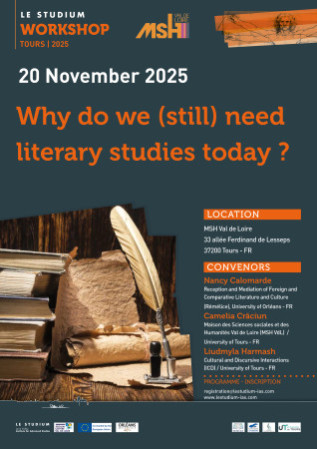Camelia Crăciun

From
In residence at
Maison des Sciences sociales et des Humanités Val de Loire (MSH VdL) / CNRS, University of Tours, University of Orléans - FR
Host scientist
Chiara Lastraioli
BIOGRAPHY
Camelia Crăciun is Associate Professor in Jewish Studies, Faculty of Foreign Languages and Literatures, University of Bucharest with a background in comparative literature and Jewish cultural history, but also theatre studies and acting. In 2016, she founded the first Centre for Research and Preservation of Yiddish Culture in Romania at the Jewish State Theatre of Bucharest. Former fellow of Collegium Budapest (Budapest), CAS (Sofia) and NEC (Bucharest), she has lectured extensively abroad on the history of Yiddish theatre in Romania and on the social history of Jewish-Romanian intellectuals during the interwar period, being recognized as a worldwide specialist on Jewish Romanian cultural history. She has edited over 20 volumes, among which the book series “Biblioteca de Literatură Idiș” (Library of Yiddish Literature, 11 titles, starting from 2016, at Hasefer Publishing House) which offered to the contemporary public new, updated scholarly editions of Yiddish classic literature. Author of three monographs: Traduceri în limba română din literatura clasică idiș (Translations into Romanian from classic Yiddish literature) (2015); 140 de ani de teatru idiș în România (140 years of Yiddish theatre in Romania) (2016) and Scriitori evrei de limbă română: de la rebeli marginali la critici canonici (Jewish writers of Romanian language: from marginal rebels to canonical critics) (2018). She was Principal Investigator and Project Director (2021-2023) for "Yiddish Culture in Greater Romania (1918-1940): in the Aftermath of the Empires and Challenged by the New National State" funded by UEFISCDI and hosted by New Europe College Institute for Advanced Study, Bucharest, Romania resulting in a collective monograph to be published by CEU Press, Yiddish Culture in Interwar Romania (1918-1940) (2025) and a volume of edited documents (forthcoming).
PROJECT
The Reception of the Vilna Troupe in the French and Romanian Press (1920s and 1930s)
Originally created in the Tsarist Empire, the Yiddish-language company the Vilna Troupe received international recognition due to its large national appeal to worldwide Jewish (especially Yiddish-speaking) communities and to its innovative performances for the non-Jewish audience. Aside from its strong ideological impact for the Jewish public, the company suceeded in transferring cultural trends and theatrical practices across Europe, becoming an international brand and a facilitator of crosscultural cooperation. While the importance of the company for the history of Yiddish theatre and for the Jewish cultural life in general has been recently documented (I. Bercovici, D. Caplan, A. Chiriac, Camelia Crăciun, N. Underwood), the impact of the Vilna Troupe beyond the Jewish community has been neglected, despite being extraordinary. Therefore, my research project focuses on the impact that the Vilna Troupe had on the non-Jewish audience across Europe in terms of cultural transfer and political reception using mainly the mainstream press (but also archival sources and memoirs if available). While at LE STUDIUM-MSH Val de Loire, I plan to investigate comparatively the distinct grounds of the success that the company enjoyed in France (1922, then 1920s and sporadically 1930s) and Romania (1923-1927 and sporadically 1930s), taking into consideration the different situations of the Yiddish-speaking communities, the reception of the Jewish culture among the non-Jewish public and the level of awareness regarding the avantgardist theatre practices disseminated by the theatre company. The outcome of the project will be a monograph dedicated to the European legacy of the Vilna Troupe (with a special focus on Romania, where the company exceptionally resided for four years and where initially the Yiddish theatre started worldwide) celebrating 150 years of Yiddish theatre globally and the draft of an ERC project documenting the impact of Yiddish theatre across European cultures.
TESTIMONY

